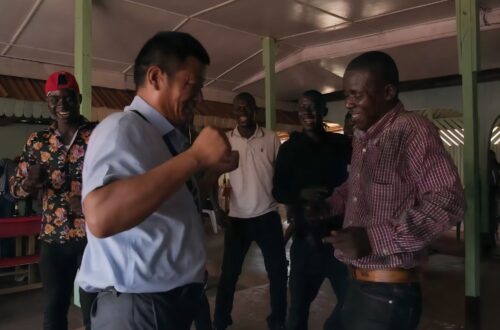‘Nina Wu’ is a psychological thriller about exploitation in film
Drawing on some of her own experiences, actress Wu Ke-xi gives a harrowing performance of a woman’s descent into the dark, make-believe hell of show business.

Born in Myanmar to Chinese parents and now based in Taiwan, Midi Z (赵德胤 Zhào Déyìn) is one of the most compelling directors to emerge from the last decade. Beginning with his first feature Return to Burma (归来的人 guīlái de rén) (2011), Z became known for a naturalistic, guerilla-style that captured the lives of the struggling workers and migrants of his home country. Ice Poison (冰毒 bīngdú) (2014), Z’s tale of a country boy who falls into drug dealing when he moves to the city, caught international attention at the Berlin Film Festival for its glimpse into the criminal underworld of Myanmar. His fourth feature, The Road to Mandalay (再见瓦城 zàijiàn wǎ chéng) (2016), about the ordeals of a pair of Burmese immigrants in Thailand, proved to be another critical darling.
The psychological thriller Nina Wu (灼人秘密 zhuó rén mìmì) (2019), viewable in Museum of the Moving Image’s virtual cinema until April 11, is a step in a new direction for the acclaimed director. It’s bigger and flashier, and while it’s similarly concerned with the exploitation of the vulnerable, the territory is the cruelty of the film industry. Wú Kě-xī 吳可熙, a frequent collaborator with Midi Z and the co-writer of Nina Wu’s screenplay, plays the titular character, a wannabe actress worried that she might never fulfill her dreams. Reduced to working as a livestreamer in her Taipei apartment, Nina has never gone beyond commercials, short films, and bit parts. When her shadowy agent Mark finds her an audition for a breakout role in a ’60s spy film, Nina’s enthusiasm is soured after she looks at the script.
Sure, the film might be a catalyst for a rich career, but it turns out that the part requires full-frontal nudity during a threesome sex scene. Pushed by Mark, who insists that her potential role is a “good character,” Nina ends up securing the part. A line by Nina’s character in the spy thriller defines the grueling experience of making the film: “They’re not only destroying my body, but my soul!” Her director might be talented, but he’s abusive and careless. He scrutinizes Nina for the slightest mistake, and isn’t afraid to slap her across the face to rile her up for an emotional scene. The conditions on set are as physically dangerous as they are mentally draining. During one scene, Nina is nearly hit by a car in the street, as the production crew flat-out ignores her.
Desperately trying to keep herself together for work is all the harder when Nina’s personal life is falling apart. Her parents have stayed in rural Taiwan, and they have their own problems. Nina’s mother has fallen ill, while her father is on the verge of bankruptcy. There’s also the matter of her relationship with a former classmate named Kiki. They used to be actresses in a rural troupe together, and it hurts Nina to see that while her career is rising, Kiki is still stuck putting on The Little Prince for children. Although important, these different subplots could have benefited from some trimming. During their duller moments, they have a habit of bogging down the film’s pacing, in an otherwise intense narrative.
Nina Wu is incredibly effective at getting under the viewer’s skin. In the boundaries between the film and the metafilm inside of it, and Nina’s warped imagination and reality, we’re sometimes left wondering whether something has truly happened or not. Even though it isn’t that bloody or violent, the movie horrifies with its crushing atmosphere and nightmarish visuals. Drawing on some of her own experiences, Wu Ke-xi gives a harrowing performance of a woman’s descent into the dark, make-believe hell of show business. While it might lack gore, the movie is explicit in other ways. There’s no subtlety in its depiction of the tortures Nina has to suffer to become a star, especially later in the film, when flashbacks cast further light onto an increasingly sickening audition.
It’s natural to consider Nina Wu as a #MeToo-themed film, but this is something Midi Z has cautioned against, and an approach bound to disappoint viewers looking for that kind of movie. Z’s work might highlight and sympathize with the plight of society’s underdogs, but it’s never been didactic or heavy-handed. With its cold and distant tone, Nina Wu possesses an unflinching honesty about the exploitation of actresses in the film industry, whether in Taiwan, Hollywood, or elsewhere.
Nina Wu and five of Midi Z’s other films are available to rent until April 11 as part of an online exhibition by the Museum of the Moving Image. Film Movement has also released the movie for virtual screenings in select American theaters. A list of showings can be found here.






